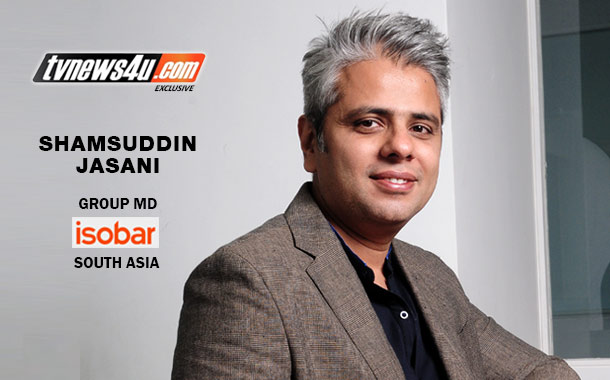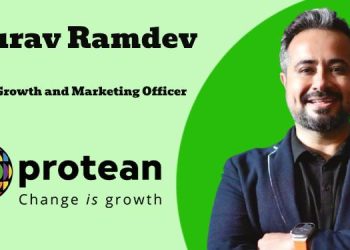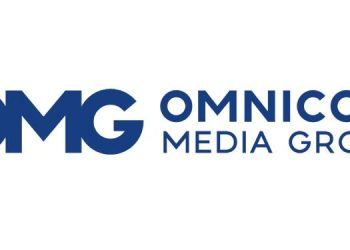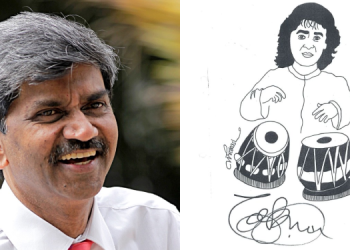By Yohan P Chawla
Having started an agency in 2008 when the world was facing one of its biggest financial depressions was certainly no child’s play. Little did Shamsuddin Jasani know then that a 2-member team in 2008 would grow to a 300-member team in a span of 10 years, winning numerous awards in the process, including the precious Clio.
With the rich experience of being on both, a media and a creative agency, Jasani wanted to launch a full-service, 360-degree agency which was unheard of back in 2008. And if you believe in coincidences, here’s the big one: just as Isobar is about to complete 10 years in the business, the Denstu Aegis Network announced the elevation of Shamsuddin Jasani from Managing Director Isobar India to Group MD at Isobar South Asia. A clear indication of the success Isobar has achieved under Shamsuddin’s leadership. How did Shamsuddin Jasani, who is also fondly known as Shams, build Isobar India, brick by brick?
Isobar’s inception
Jasani says, “Looking back, we started in 2008. Back then, digital was very different from what it is today. The entire atmosphere was different because I joined in 2008 and, by the end of that year, there were only two people in Isobar. That is how we started Isobar. We won about six accounts in 2008 itself, which was not bad for a 2-people company.”
Due to the global financial depression in 2008, marketing budgets got slashed big-time. However, Jasani and team considered that a good thing rather than a bad one, because since clients did not have big monies, they could start experimenting on digital, because obviously, for traditional media, you need to have a large budgets.
“The first few years was just about getting our act together. So from Day One, I think our ethos was about doing a full-service agency in the digital space. When we started in 2008, there was no agency which spoke about full-service digital.” says Jasani, reflecting on the past.
2009 was when they got Gopa Kumar, EVP-Isobar, who went on to set up Isobar’s Delhi office. It took about 2 years to settle the Delhi office.
In 2011, Isobar further branched out to Bangalore. “Other agencies were not looking at Bangalore in 2011, and we clearly saw that there was a requirement. Now, we have the largest team as far as Bangalore is concerned. In that year, we got some great people to work for us. We got Anish Varghese, who is our National Creative Director,” says Jasani.
Reebok has been with it since Isobar’s inception, and it’s a client with whom Isobar has won the maximum number of awards, including the prestigious Clio.
People and Clients
Starting from a 2-member team Isobar today has a team of 300 people, across Mumbai, Delhi and Bangalore.
“We have built Isobar on the basis of hiring people who are better than us, and that is a mantra which I have actually learnt from my boss Ashish Bhasin. The first thing that he told me in 2008 was, ‘hire people that are better than you’. In the initial stage, I had hired some people who were more expensive than me as a CEO,” says Jasani on hiring people.
Isobar grew three times in the period from the middle of 2012 to 2014. And a 42-member team grew to a 130-member team. Which understandably also doubled profits and revenues along the way.
Jasani believes in hiring people “who make you redundant, grow to a level where you are not needed in the organization”. He adds, “God forbid if I fall ill, and for whatever reason I am not here in Isobar, I am sure Isobar will not fall. Isobar will move ahead and in the next 10 years, will still remain at the peak, that it is because of the people in the organization, the senior leadership as well as the amazing middle management which keeps on winning clients and winning awards.”
Challenges
According to Jasani, the biggest challenge that Isobar faces is of talent, and it’s not just the number of people but the quality of people.
The other challenge is the speed at which things change in the digital industry. However, looking at these challenges from a different perspective, Jasani sees an array of opportunities.
He says, “In 2016, Jio came and changed the entire data landscape. It’s a good thing for us. Not sure how good this is for the mainline because it is shifting a lot of consumption onto digital. That’s a perfect example of the fact that you need to be on your toes all the time. And keep up with, and stay ahead of the curve.”
I ask him if he views big consultancy giants entering the digital industry as a threat. Jasani says, “While the last 10 years of Isobar were about digital marketing, the next 10 years of Isobar are going to about using digital to transform the client’s business, now that it is taking us into the territory of consultancy giants like Accenture and KPMG. While these giants are entering our territory, we are looking at digital transformation and consulting, which is their territory. But they are not digital experts, we are the digital experts.” Jasani ädds, “It’s a very appetizing and lucrative thing for big consulting giants to step in the digital space, they are just acquiring agencies to do the work. I don’t think they really understand digital that well. Their capabilities lie somewhere else. We are not scared; we are quite happy. Clients are waking up to the fact that digital transformation is a big thing.”
Learnings
Reflecting back on the journey, Jasani spoke about how search was the big thing. And that Facebook had just started, and there were no ad sales. It was just a platform for knowing people. It lacked the advertising perspective. Isobar has been quick to adapt to the changes in the landscape.
“The focus has to be on your people and the profits. You cannot run a business which is not profitable. And when you’re running a profitable business, your teams need to understand how to run a profitable business. We at Isobar have always been on the client’s side, whether while talking to the industry or voicing our opinion on brand safety, we are always on our client’s side.” says Jasani.
On being asked how difficult is it to convince clients to move from traditional to digital mediums, Jasani says, “Not any more. In the initial stages it was very difficult because digital was allotted just small left-over budgets. Times are very different now; when we started it was very difficult to convince the clients to come in, I think it took about 4 years to get the case studies and the clients right. In 2012, clients started seeing that digital is important.”
Jasani says, “The question now is not whether one should do digital but on the role of digital. And that digital should not work in isolation. All media need to work with one another. It cannot be in isolation. And digital needs to take a more centric role.”
Isobar and its global counterparts
Isobar India integrates a lot with their global teams, first with APAC and then their global partners. Isobar commerce is another offering launched three months back. A global platform on commerce created in India, which has about 200 people in Pune, who provide end-to-end commerce solutions to clients.
Jasani says, “That is an integrated global offering that we have. As Isobar Global, we have process and tools which are only for us, which are used to integrate all the teams. We get help from other teams and creative directors from across the world to work on important pitches in India and vice versa. Recently, there was a pitch in Europe for which our team here helped the team out there. We work very closely with the Isobar global teams across the world.”
Isobar’s Use of Technology: Machine Learning & Artificial Intelligence
Isobar’s NowLab, which primarily experiments with technology, helps clients understand and adopt technology.
Jasani says, “AI is going to impact everyone in the way we ourselves do work, so a lot of everyday tasks are going to be taken up by AI and ML. It is going to come in much faster than people actually anticipated. As far as the marketing side of the business goes, it is something that has not been exploited to the fullest. But the very basic level of AI is what we have done in the Chatbot we created for Maruti Suzuki.”
Speaking on Isobar’s integration of AI, Jasani says, “We are working with clients to use chatbots. In a year or two we will be working with a lot of clients where we will eliminate a whole lot of problems which are created because of a human sitting on the other side who is not very happy. We will actually have a chatbot who will be able to answer your queries in a much better and a faster way than a lot of humans can. AI will replace tele-callers with chatbots. Not to forget, AI has a lot more applications.”
Jasani believes that AR is going to be huge and a lot of adoption from the brand perspective is happening with AR. “The biggest game-changer will be voice,” he says, “and will change the way we interact and not just advertise. Isobar is heavily investing a lot of time and energy on voice. For example, in the US, voice searches have overtaken regular searches in the 30-and-younger age bracket; they are not typing anything. They are using Voice searches.”
Isobar’s Block-chain compliance
Jasani says, “No, we can’t say block-chain compliant. Block-chain is a way of storing data and records. Now you can’t be block-chain-compliant because there aren’t enough platforms that are using block-chain. In advertising, yes, I think, it still is a questionable thing but I do believe that it will eliminate a lot of flaws on fake and fraud advertising.”
He adds, “For example, I am doing programmatic advertising and it’s completely automated. I know exactly where a particular entry was made in the entire chain of events which led to where it is today. Block-chain is still in infancy mode, and people in India have not used it so much. From a media perspective it will get really important — especially branded content and programmatic advertising.”
Focus on Isobar Commerce
The second big focus area, with the launch of Isobar Commerce, will be e-Commerce. They are building relationships with marketplaces to understand how they work and to offer end-to-end e-commerce solutions to clients.
“It’s a very exciting phase for us as an agency now considered as one of the market leaders,” Jasani says. “Our focus will not just be for creating good stuff for Isobar and DAN but also towards the industry. The future is going to be Isobar kind of giving back to the industry, trying to make sure that the industry shapes in the right way. And work for brand safety, privacy and protecting consumers,” he says.
Speaking on acquisitions, Jasani said, “As Isobar India, we have acquired Fractal. Very soon we should be acquiring an agency because the market is changing at a very fast pace. There are eight-ten different kind of technologies, different kind of industries and hence our focus is as many as we can, but there is a limit in-terms of how much you can do organically.”
Way forward
In the next 3 to 5 years, Isobar plans to invest a lot in technology. In the short-term future, they feel voice is going to be the big thing. Jasani says, “Jio has a 500-rupee Jio phone and all of them are voice-enabled. Voice breaks down a lot of barriers such as the literacy barrier. The scale will just change!”
Elaborating on his vision for the way forward for Isobar, Jasani says, “We want to change from being just a digital marketing agency to an agency for the digital world. By that I mean it’s about going to clients and working with them to use digital to make a difference to their business and how digital can be intrinsic to their business. Digital transformation is something that we will focus on as the big thing,” he concludes.

















